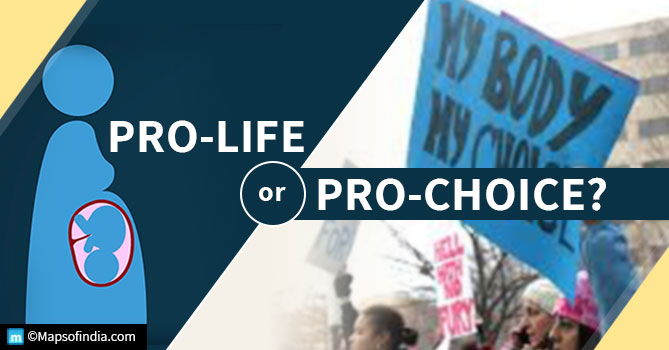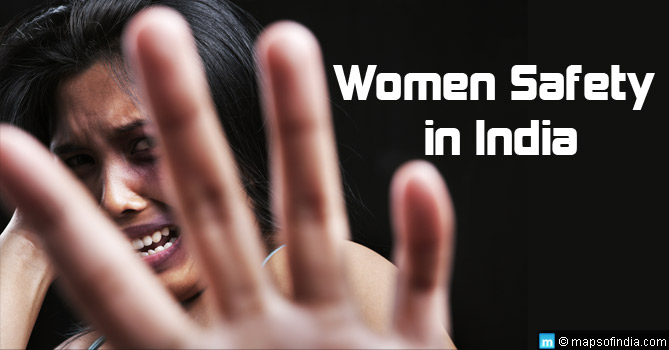The last decade saw an increased number of debates between two groups, popularly known as- “pro-life” and “pro-choice”. The essentials of the issue, however, are both age-old and not confined to any national borders. Taken in the Indian context, the debate becomes more tricky, courtesy of our entangled morals and societal values.
What is the debate on abortion?
Pro-life: The argument put forth is that the foetus is entitled to basic human rights from the moment a pregnancy is conceived. That being said, the “pro-life” side generally puts abortion and murder on the same pedestal, since the former is said to be violating the “Right to life” of the foetus.
Pro-choice: The “pro-choice” group focuses on the individuality and freedom of the woman concerned. Their argument is that it is the woman alone who has a right over her own body and under no circumstances, shall anybody else, including the state interfere in her personal bodily choice. Given that logic, it should be the sole decision of the woman in question if she wants to continue with the pregnancy or abort it.
The Indian picture
Since the introduction of Medical Termination of Pregnancy (MTP) Act, 1971, abortion is legal in the country. It is considered to be among the more progressive abortion laws in the world, where about 18 countries are yet to remove the ban from termination of pregnancy. Our country has an average of 6.4 million pregnancies terminated every year. However, despite the existence of the said law, a large share of abortions are from the “unsafe” category. Figures state that about 13 women die every day in India due to unsafe abortions. It is the third major cause of maternal deaths in the country.
It is a curious scenario. If our law grants women the legal right to terminate a pregnancy (with some barring conditions), why is it that so many of them resort to unsafe methods, even risking their own lives in the process? One probable answer is stigma, especially in case of unmarried women. The faults in our judicial system is another.
Medical Termination of Pregnancy Act, 1971: A redundant law?
The Act, while declaring abortion legal in the country, at the same time, imposes several restrictions. The law hasn’t seen an amendment in years, with the 2014 amendment bill yet to pass in the Parliament. The Act allows termination of pregnancy of up to 12 weeks with the approval of one Registered Medical Practitioner (RMP), and of two in the case of the pregnancy being between 12-20 weeks.
However, aborting past 20 weeks is not allowed and there have been several cases of petitions for the same being rejected. While the reasons stated are general medical concerns for the woman in question, the law is questioned for its authenticity in the present times. When it was introduced in 1970, fewer technological advances had been made. But, with time, technology and medical achievements progress too and the same has happened with aborting facilities available. Several gynecologists have assured that in today’s world, the 20 weeks bar is too harsh and it can be extended further without posing any risk to the woman’s life. Secondly, several abnormalities in the developing foetus can only be detected in ultrasound past the 20 weeks deadline.
People demanding a reform say that the law needs to take into account the medical advancements, as well as the problem of detecting abnormalities in the presently stated duration of 20 weeks. It is further added that more decision making power needs to be given to women, respecting their right to make decisions about their own body.
The society and our stigmas
We live in a country that rarely talks about sex without resorting to hushed tones. School children are taught nothing in the name of sex education. As a society, we tend to boast about our culture often, always ready to charge at other people with our moral policing. Women’s expression of their sexuality, for example, is one thing that never fails to raise a red flag.
While we talk about abortion and try to locate it on our moral compass, we need to think with a logical mind. The debate can not be initiated without first acknowledging that every woman is an individual being, with full rights to make decisions about her life. Thinking about this aspect closely, a logical mind would close the debate at the same point. When it is her own body, something as serious as pregnancy cannot be anybody’s but her decision to make.
If we try to come up with arguments on why a woman should not be making a decision so crucial to her life, then perhaps we need to get our sense of entitlement back on track.
Explore More………
Euthanasia in India: Which side are you on?
Stop Female Foeticide – Save the Girl Child






